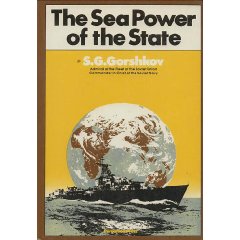Archive for November 13th, 2008
Gorshkov’s “The Sea Power of the State”
 First published in 1976 by Admiral of the Fleet of the Soviet Union (and Commander-in-Chief of the Soviet Navy) Sergei Georgyevich Gorshkov, “The Sea Power of the State” was a dramatic departure from the normally narrow texts from leaders of the Soviet defense establishment.
First published in 1976 by Admiral of the Fleet of the Soviet Union (and Commander-in-Chief of the Soviet Navy) Sergei Georgyevich Gorshkov, “The Sea Power of the State” was a dramatic departure from the normally narrow texts from leaders of the Soviet defense establishment.
In this book, Admiral of the Fleet Gorshkov not only offers a vision of the relevance of the “World Ocean” to any nation’s well-being — he also provides a compelling rationale for “joint operations” a full ten years before our own nation’s Goldwater-Nichols Act forced jointness onto a reluctant American defense establishment, and underscores the importance of the littoral in a navy’s ability to influencing events ashore nearly two decades before “… From the Sea”.
The Sea Power of the State is rich in dichotomy: a land-rich nation with few accessible ports preaching the relevance of sea power, an atheist totalitarian regime describing the social and cultural significance of the “World Ocean”, a nation besmirched for its negative impact on the environment bemoaning pollutants and the need for “union with the environment”, and a foundational tome for effective naval force planning from a nation that just this month claimed the lives of nearly two dozen civilians in a submarine accident. Such is Gorshkov’s compelling style — scholarly and impeccably researched, with steadfast devotion to the tenets of Marxism, decrying the “imperialist aggression” of the Capitalist powers who exploit sea power to “hold in check other states.”
Despite the Communist propaganda (which is seamlessly woven into Gorshkov’s prose), The Sea Power of the State is replete with history, statistics and analysis. Gorshkov calls the World Ocean “the most important environmental element of Marxism”, underscoring the essence of sea power as “linkages amongst elements” of a far-flung enterprise. Sounding more akin to Sir Julian Corbett than Alfred Thayer Mahan, Gorshkov addresses sea power from a temporal (vice just geospatial) perspective.
Most impressive about Gorshkov is the breadth of his perspective. Alongside the typical Communist demagoguery (e.g., “Imperialist powers exploit sea power to preserve their monopoly …”) are lucid arguments for balanced force structure planning (inclusive of creating large merchant fleets), diminished pollutants, and even maritime law (with an appeal to demilitarize the World Ocean beyond the 12 mile territorial waters). Curiously, he never once expresses disdain at the limited blue water access of the Soviet Union — and was convincing enough in his vision that the Kremlin subsidized his development of a fleet that nearly reached parity with the dominant sea powers of the west.
He dedicates nearly 100 pages to Chapter 2: “Pages in the History of the Navies”, covering nearly five hundred years from the time of Columbus to the Brezhnev-era legacy he helped build. He deftly describes the crushing Russian defeat in the Straits of Tsushima (in 1905) as being ” … decided in advance” due to the technological and doctrinal advantage of the Japanese fleet operating in its home waters, and to the Czar “… completely misunderstanding the importance of sea power for Russia.” As this defeat preceded the October Revolution, Gorshkov quotes V.I. Lenin’s remark that, at Tsushima, Russia “… faced not only … a military defeat, but also the complete military bankruptcy of the autocracy.”
Admiral of the Fleet Gorshkov is credited with building the Soviet Navy — a Navy that achieved its strategic purpose in freezing the “imperialist” threat, forcing our rigid attention to the Greenland-Iceland-U.K. (GIUK) Gap and the northern Pacific Ocean. Through his deep grasp of the “universality of sea power”, its “decisive role in influencing events ashore”, its policy role (in “stabilizing allies or subjugating them”), and the “value of balanced force structure”, Gorshkov gave the Soviet Union a dominant role on the world stage — and, had he been born a few decades sooner, may have altered the course of history.
UPDATE: The inestimable Zenpundit has posted a review of the review — and has added invaluable context to the political machinations of what Zen calls “the noontide of Brezhnev’s faction.” Check it out.